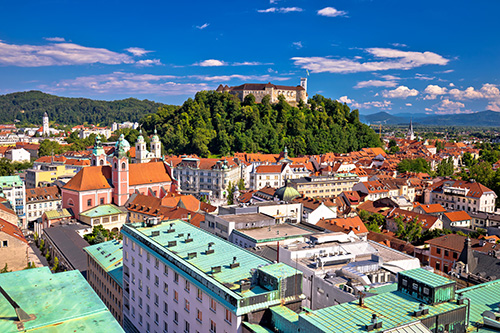This year, the EESC honors outstanding citizens’ initiatives that champion equal opportunities for women and men and contribute to empowering women in society and the economy
The European Economic and Social Committee (EESC) has announced that it has chosen five finalists from among the 177 projects it received for its Civil Society Prize 2019, dedicated to the empowerment of women and the fight for gender equality. The shortlisted entries are from Belgium, Bulgaria, Finland, Italy and Poland.
The award ceremony will be held on 12 December during the EESC plenary session in Brussels, when the final ranking will be revealed. The total prize money of EUR 50 000 will be shared among the five nominees. The winner of the first prize will go home with EUR 14 000 and the four runners-up will each receive EUR 9 000.
This year’s theme, More women in Europe’s society and economy, attracted the second highest number of entries in over a decade-long history of the prize, just behind the 2016 theme of migration. The candidates are from no fewer than 27 Member States, demonstrating the widespread interest of citizens and civil society organisations in taking action to tackle gender inequalities, which still loom large in Europe.
The EESC Vice-President for Communication, Isabel Caño Aguilar, said: The many award applications we received show that gender equality is at the heart of civil society’s aspirations. They highlight women’s work and their innovative role in society. They promote dynamic, visionary, courageous, bold and strong women. They address the specific needs of vulnerable or disadvantaged women and tackle gender discrimination and stereotypes in all areas of life.
The five nominees, listed here in alphabetical order, are:
Fairy Tales project, by the Bulgarian NAIA Association, engages pre-school children and their parents in reading classical fairy tales from a different perspective and adopting a critical approach to the stereotyped gender roles instilled into boys and girls from the earliest age. The project wishes to encourage children to look beyond traditional gender roles to express their personal potential and to see that many different opportunities are out there for both girls and boys.
#mimmitkooda (Women Code), a programme by the Finnish Software and eBusiness Association (Ohjelmisto- ja e-business ry) combats the stereotype that software developers should be male by default. The programme is successfully bringing in more talented women to the software industry and helps them move towards better paid jobs and careers.
Polish Women’s Strike is the largest women’s movement in Poland and now seeks to empower invisible and ignored women activists in small and middle-sized cities as they represent the major force for social change. The movement made world headlines with its Black Monday strike in October 2016, when it organised over 1 500 protests and marches in 150 Polish cities to call for women’s and civic rights and condemned the government clampdown on the independent judiciary.
The Brussels Binder is a database of female policy experts which helps ensure better representation of women in European policy debates. Compiled and run by a group of dedicated volunteers in Belgium, its purpose is to put an end to male privilege in the “EU bubble” and to become a go-to resource for finding female policy experts. This will improve the gender balance of panels and the media in Brussels and make sure that laws and policies take into account the specific needs and opinions of women.
Women’s Toponymy, an association from Italy, believes that toponymy – the study of place names – reveals the way society sees its members. Its research has shown that in Italy, only 7.8 streets were named after women for every 100 named after men, and that the majority of female place names are of religious origin. Women’s Toponymy aims to increase the number of places bearing the name of notable women and to teach younger generations about their important contribution to society and history, so as to give women the public recognition they deserve.
Commenting on the choice of the theme for this year’s prize, Ms Caño Aguilar said: Time goes by. Inequality of opportunity between men and women remains. In this day and age, it is unacceptable that women, who make up over half of the EU’s population, still suffer from discrimination and gender violence.
Despite the progress made in the last decades and the fact that it is one of the founding principles of the EU, gender equality is still a dream in the EU, with women continuing to earn less than men. The gender pension gap is at a staggering 38%, making poverty in old age increasingly female. Women remain a small minority among political decision-makers and company executives, and account for only 31% of entrepreneurs.
Gender stereotypes permeate all spheres of life and gender-based violence remains widespread in many forms, ranging from domestic violence to sexual harassment and cyberbullying.
As a fervent advocate of gender equality, the EESC has repeatedly warned of persistent gender segregation and discrimination in European labour markets and society. Prompted by a recent backlash against women’s rights in some EU countries, earlier this year it called for a political commitment to achieving equality between women and men in Europe.
In pursuit of these aims, the EESC launched the Civil Society Prize in June to highlight progress towards a more equal society for women and men and to encourage further action.
The prize, now in its 11th year, is awarded to individuals and non-profit organisations for “excellence in civil society initiatives”. A different theme is chosen each year, covering an important area of the EESC’s work. The prize money and the recognition received should help the winners to scale up their projects and provide further help in the community.
In 2018, the prize went to initiatives that celebrated European identities, values and cultural heritage. Previous themes included innovative entrepreneurship supporting labour market integration of disadvantaged groups, combating poverty, and solidarity with refugees and migrants.


